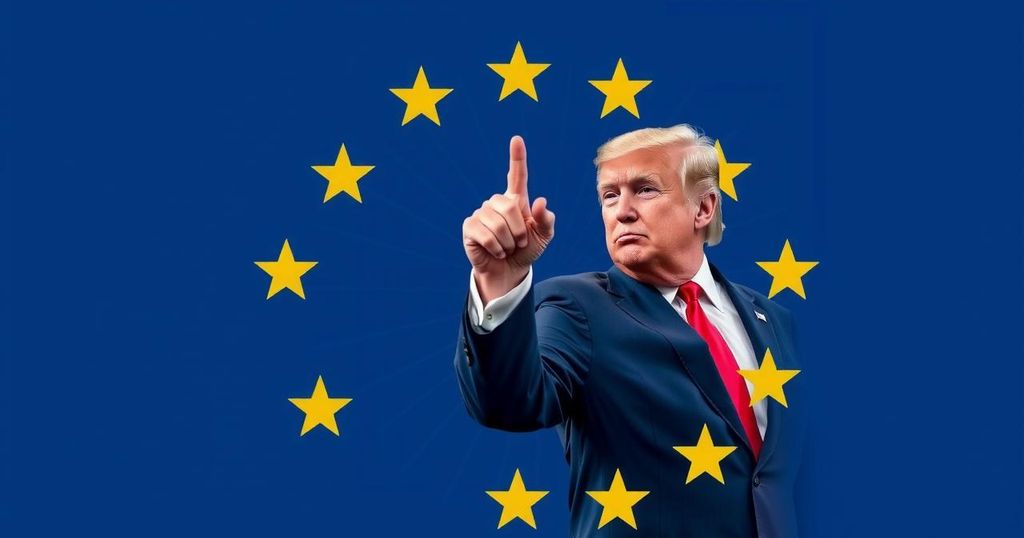The article explores the anxiety felt in Europe regarding the implications of the upcoming U.S. presidential election, particularly the contrasting potential outcomes of a Trump or Harris presidency. It delves into concerns over economic repercussions, NATO relations, and the state of democracy and nationalism across Europe, emphasizing that the election will have critical and lasting effects on the continent.
As the United States gears up for its pivotal presidential election, anxiety among European nations swells like a storm cloud on the horizon. The outcome is poised to send shockwaves through Europe, affecting security, economic stability, and the very fabric of democracy across the continent. From the bustling corridors of Brussels to the quiet offices of national capitals, European leaders have spent the past year mulling over the potential repercussions of a Trump victory. This preoccupation, while intense, has often been overshadowed by a lack of actionable strategy. Many have cast long glances toward a Kamala Harris administration, perhaps naively optimistic about its implications for European interests, while also neglecting to ponder what a Harris presidency could entail. European concerns are particularly acute regarding economic relations. Should Trump trigger another trade war, Europe faces the daunting task of navigating the tumultuous waters of retaliatory tariffs—much like a ship in a storm trying to outrun rising waves. The question looms: How would European nations respond amidst an ongoing trade conflict with China? In terms of security, anxiety escalates palpably. A Trump re-election could lead to a dramatic shift in U.S. foreign policy, raising fears of an abandonment of Ukraine and potential backdoor deals with Russia. Such outcomes might fractiously divide Europe, with some nations advocating for resistance while others lean toward capitulation. On the flip side, a Harris win—while perhaps less alarming—still evokes concerns about a gradual disengagement from NATO and Ukraine, necessitating an urgent push for a more cohesive European defense strategy. European leaders may yearn for unity in the face of a collaborative effort with a sympathetic ally in the White House, notwithstanding a considerable reluctance to surrender their sovereignty for integrated defense structures. The impending election also casts a long shadow over the state of democracy in Europe. The rise of nationalist-populist movements reflects the continent’s struggle, echoing past turmoil intensified by Trump’s presidency which initially galvanized unity among European leaders. Should Harris secure a victory, her focus on civil liberties and democratic processes could invigorate liberal democrats seeking to combat the rise of illiberal governance within their borders. However, should Trump triumph, the emboldenment of right-wing populism could threaten to unravel the very foundations of democratic ideals across nations, like a tapestry slowly being pulled apart. The stakes could not be higher; Europe stands at a precarious crossroad. The ripples of the U.S. election will undoubtedly wash ashore with immense impact, shaping both the future of European security and the integrity of its democracies.
The article discusses the implications of the upcoming U.S. presidential election on Europe, highlighting the anxiety prevalent among European policymakers regarding potential outcomes, particularly focusing on Donald Trump and Kamala Harris. It emphasizes how U.S. elections significantly influence global dynamics, especially in Europe, regarding security, economic relations, and the health of democratic institutions. The background analysis explores the historical context of U.S.-European relations, the rise of nationalism in Europe, and how domestic U.S. policies can reverberate throughout the continent.
In conclusion, the upcoming U.S. presidential election holds profound implications for Europe. A Trump victory could exacerbate economic tensions and deepen security concerns, potentially leading to a fragmented Europe grappling with nationalism and a weakened democratic foundation. Conversely, a Harris administration may offer a reprieve for liberal democracy but poses its own challenges in rallying European unity on defense strategies. Ultimately, the outcome of the election will significantly shape Europe’s trajectory, underscoring the interconnectedness of global politics in a rapidly changing world.
Original Source: www.theguardian.com

Leave a Reply